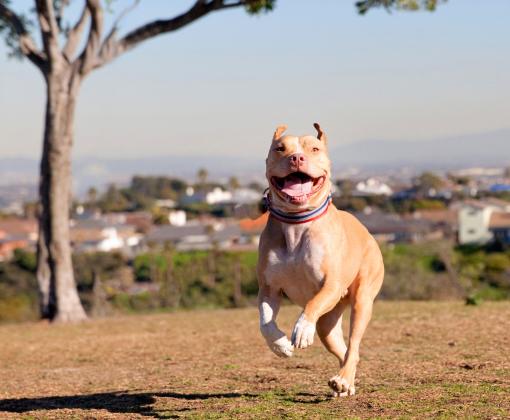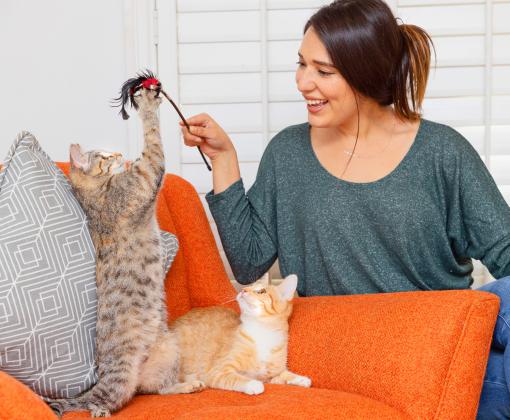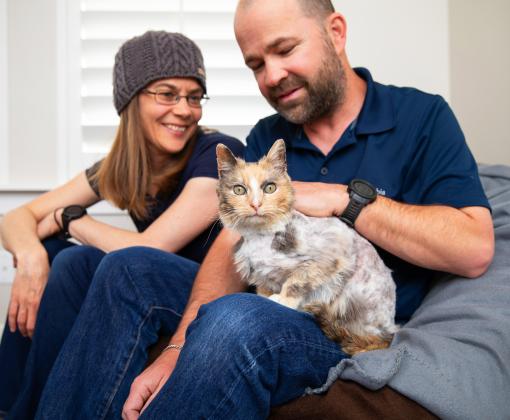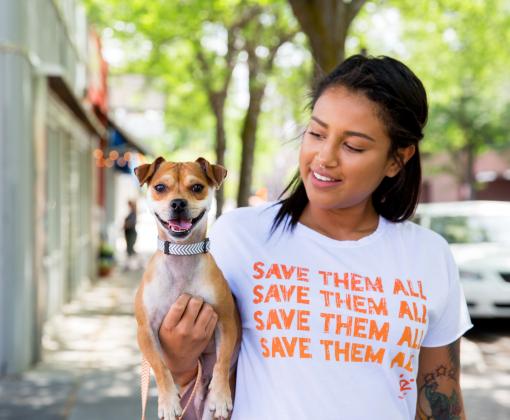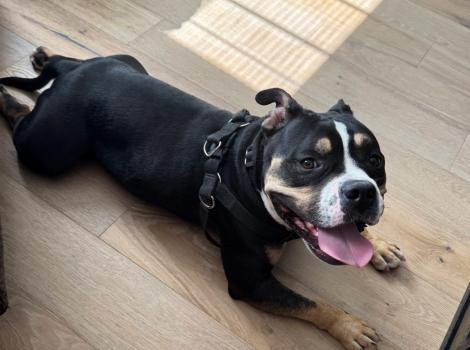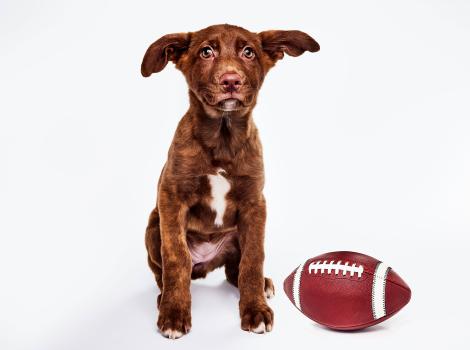Historic victory for dogs in Florida
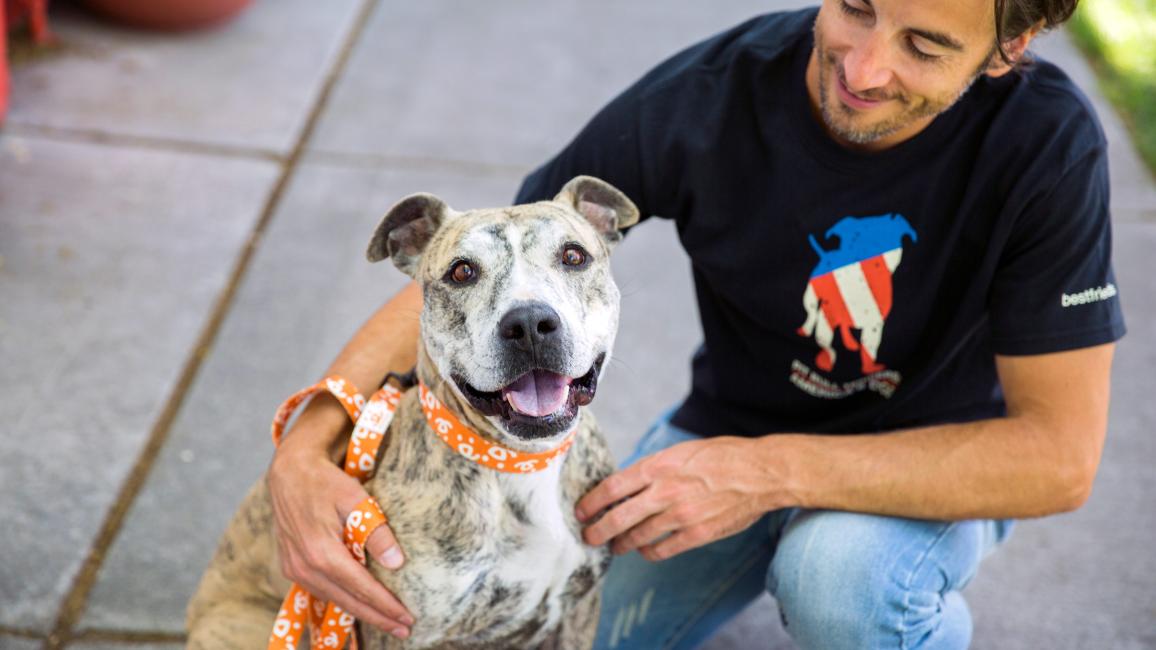
Miami-Dade County resident Dahlia Canes had no idea what she was getting into when she found a stray pit bull terrier-like dog nearly two decades ago. It took only a few minutes for the friendly and sweet dog — whom Dahlia subsequently named Chocolate — to clamber into the car. Dahlia was smitten.
However, taking in Chocolate would present challenges due to the breed-specific legislation (BSL) — legislation that bans or restricts certain types of dogs, deeming them “dangerous” based simply on their appearance — that had existed in the Florida county since 1989. Like lovers of the many dogs who get swept up by BSL, Dahlia went to great lengths to keep Chocolate under wraps.
“To keep her safe, I took her to a friend’s home in Palm Beach, where she stayed for a year,” says Dahlia, who would visit Chocolate on weekends.
That experience lit a fire under Dahlia. Although the state passed preemptive legislation in 1990 prohibiting local governments from passing new restrictive ordinances, Miami-Dade County was exempt because its legislation was already in place. The only other community where this applied was the city of Sunrise in Broward County.
In 2004, Dahlia launched Miami Coalition Against BSL (MCABSL) to eradicate such unfair legislation. Ever since then, she has been sharing data with the public about the fact that a dog’s appearance says nothing about their behavior and that legislating against certain dog breeds in the name of safety is misguided. In fact, appearance also isn’t always an accurate indicator of a dog’s breed or type either.
[Why Breed-Specific Legislation Is Ineffective]
Best Friends Animal Society has also spent many years campaigning against BSL and informing the public about the science showing that looks don’t dictate behavior. Best Friends’ national campaign against such legislation launched in 2009, and the first bill to remove it in Miami-Dade County was submitted in 2012. Also, in 2015, the challenge to the no-adoption policy for pit bull-like dogs at St. Johns County Animal Control in St. Augustine, Florida, succeeded. It argued that the policy violated the 1990 state law, and the government agreed.
“We were confident that the same argument could be applied specifically to government-funded housing in Miami-Dade County,” says Laura Donahue, Best Friends senior director of legislation and advocacy. “Though we challenged it last year and the bill made it through the state Senate, the legislative session ended before it could be addressed in the House.”
This year, however, the many years of effort to eliminate BSL throughout the state are about to bear fruit. In addition to submitting multiple bills, Best Friends enlisted the public’s assistance via the 2025 Action Team, a national group of advocates who organize and mobilize to create lifesaving change in their communities. Advocates sent more than 2,000 messages to elected officials in Florida urging them to do away with BSL once and for all.
“This year Senator Alexis Calatayud and Representative Demi Busatta Cabrera, both representing portions of Miami-Dade County, filed SB 942 and HB 941,” says Kelsey Gilmore-Futeral, legislative attorney for Best Friends Animal Society. “As a result of all this collaboration and hard work, both the Senate and House of Representatives overwhelmingly passed the bill.” Gov. Ron DeSantis signed it on June 16, and it goes into effect in October 2023. “It will not only help dogs of any breed or size in the state, but will serve as a model that others can use to ensure more protections for dogs and their owners in other communities,” Kelsey says.
SB 942 will apply to Florida counties, cities, and 100% of government-funded public housing authorities and prevent them from adopting ordinances or policies designating a dog as dangerous based solely on breed, weight, or size.
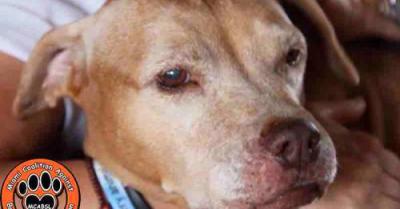
Action targets breed bans in government housing
Some form of BSL can still be found in many cities, counties, and states, but there were specific reasons why Best Friends chose Miami-Dade County for this latest push. First, Florida ranks among the top five states where the most animals are losing their lives in the sheltering system. But it also is populated by people who want that to change.
Housing is one of the most frequently cited reasons for relinquishing a pet, and in many cases that is because people with lower economic means can’t access affordable housing and keep their dogs. Low-cost, government-subsidized housing isn’t an option for all of them either. A survey of public housing authority pet policies across Florida found that 60% had breed restrictions, and all the policies reviewed restricted pets to under 40 pounds.
“We literally have people living in cars with their dogs,” says Denise Deisler, CEO of Jacksonville Humane Society (JHS). “These people are often eligible for government housing, but they won’t take advantage of that option because it rules out an important part of their life. If we could do away with such limitations, the number of viable housing options for these families would automatically increase. It would create a double benefit by ensuring both people and animals can access safe, affordable, adequate housing.”
Part of SB 942’s strategy was to challenge BSL in government-funded housing.
“We knew the government would be far more likely to step in and regulate something funded with taxpayer dollars than try and control the private real estate market,” says Kelsey. “We also knew the argument that would most resonate with the state centered on people’s right to responsibly own whatever breed of dog they want.”
Removing barriers to ownership would give every animal welfare organization in the state the ability to advocate for all dogs in their care. Those who are going to great lengths to stay under the radar — like Dahlia with Chocolate — would be able to confidently walk any breed of dog in broad daylight and not worry about having them taken away based solely on their appearance.
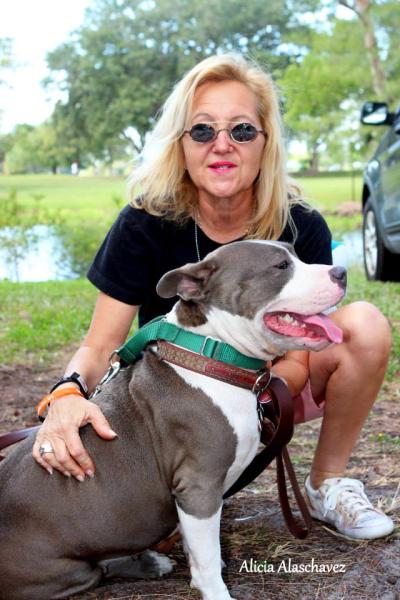
Legal tactic aims to have even broader impact
“It was smart of Best Friends to approach the issue from the angle of discrimination in federal and state-subsidized housing,” Denise says. “This is an important first step in setting a standard that private landlords and property owners will hopefully follow suit on. We won’t be removing all the barriers for those dogs, but housing is an important one.”
“SB 942 will open the door that much wider for all dogs to someday get the homes they deserve,” says Laura. “It will also put Florida even closer to becoming one of the states that currently prohibit BSL anywhere within their borders.”
The legislation likewise won’t impact local government’s ability to create good, sound policies based on dog behavior to ensure the safety of the community.
[How you can advocate for shelter animals in 2023]
“Science has been clear for decades: Breed does not determine behavior,” Laura says. “This is why Best Friends partners with the International Municipal Lawyers Association to create model policies for local governments around dangerous dogs. This legislation does not impact local (governments). It simply removes outdated laws that unnecessarily separate pets from their people.”
As for Dahlia and MCABSL, the fight is hardly over to protect many dogs in the state who still fall victim to breed-driven bias in private housing as well as to dog fighting and animal abuse. And even though she passed away years ago, Chocolate continues to be Dahlia’s guiding light every step of the way.
“I promised her that I would overturn this legislation,” she says. “When it passed the House and Senate, I was finally able to breathe. I took this huge breath and exhaled because I knew that I had kept that promise.”
